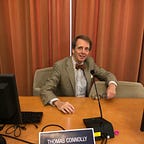Memories I Should Have Had
Part Four
7 March
Washington, D.C.
Joe Alsop calls me at the Hay-Adams, where I’m staying, and asks me if I’ll drive a cherry tree over to Arlington National Cemetery where Stewart, his brother, will plant it by William Howard Taft’s grave. It’s supposed to bloom next year at the anniversary of the Japanese government’s presentation of the cherry trees.
Alsop tells me, “Stewart forgot the tree in the bar. He knows better than to have four martinis at lunch. But, he might have seen Art Buchwald waddling around. There’s a rumor he’s here on a flying visit. That’s enough to put anybody off his game.”
Alsop explains it’s a personal favor for Senator Robert Taft. It means a lot to Alsop; I owe him, so I agree. I want to get out of town, but since I’ve promised to drive Oscar Levant and his wife to The White House later that night, it’s not such a big deal. Levant’s developed a morbid mistrust of cabs. He complains to me: “I won’t let some taxi meter out my existence. I’ll bet you Jean-Paul Sartre never took a cab in his life!” Another notch on Oscar’s neurosis belt.
With the help of two bell boys and the door man, I get the tree into the back of my car. Good thing it’s a convertible. The damn thing’s gigantic.
Martha Gellhorn’s vanity case is on the floor of the front seat. Great. I’ll have to get that back to her. Why did she insist on going back to her hotel last night? I’ll never get out of this town.
I cross Arlington Memorial Bridge and when I get to the other side I notice a man strolling unsteadily in the middle of the road. I have to slow down. He turns and stops. I jam on the brakes, but the front bumper knocks him down. I jump out of the car to help him. I get him to his feet; he buckles a bit and mumbles, “What can one say?” It’s not my bumper that’s done this to him. He’s smashed.
His pin-stripe suit looks like he slept in it, and now there’s hole at one knee. His tie is odd, black and turquoise-striped; it looks chewed up. Laying the plummy on thick he asks, “Wouldn’t dream of taking advantage of your attempt to run me down old boy, but might one get a lift? Motorcar’s no more than a mile…” I tell him, “Sure, hop in.” We set off.
Consonants slumping, he offers, “Where are my manners? How do you do? I am Guy Burgess, second secretary at the Embassy. British…” Then he notices the vanity case.
He lifts it to his lap, “It’s a Hartmann — they always have a secret compartment.” He opens it, rummages, finds a bottle of mouthwash. He unscrews the cap, takes a big swig, coughs, then says, “One’s in luck — it’s Listerine!” He takes another, longer drink. Then I see a car pulled off the road, up on a jack. A shirtless man is changing a tire. “Here we are,” says he. I stop the car. Only then does Burgess notice the tree in the back. He recites:
Loveliest of trees, the cherry now…
And since to look at things in bloom
Fifty spri’gs are little room,
About the woodlands I will go
To see the cherry hung with snow.
He glances at the muscular young man changing the tire and mutters to me, “I’d rather see a hung cherry. Dear old Housman — queer old Housman.”
Then he gags, leans his head over the side and vomits. He recovers, smiles, and says, “One can’t be too careful. One’s had three speeding tickets today.”
I leave him by the side of the road.
